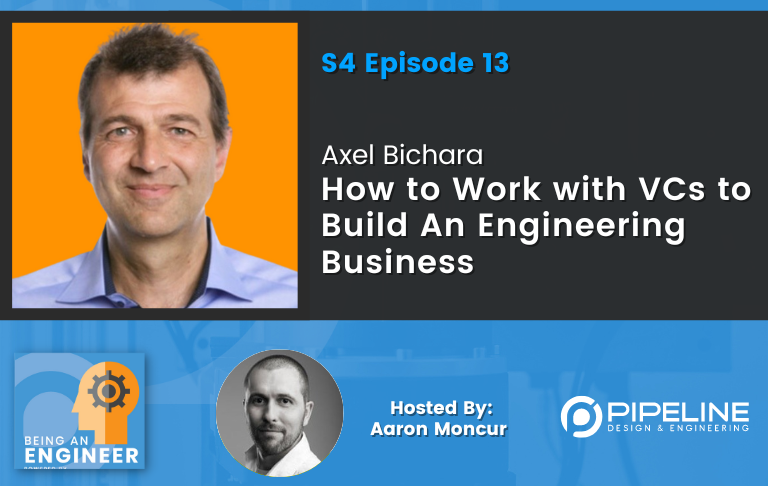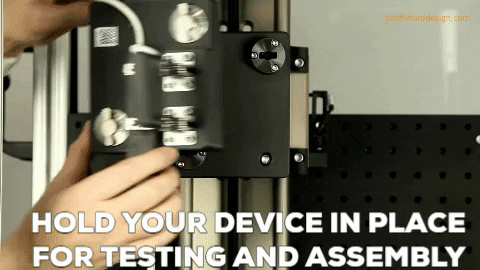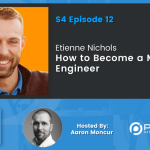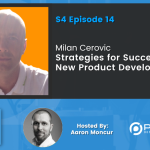Axel Bichara | How to Work with VCs to Build An Engineering Business

Who is Axel Bichara?
Axel Bichara is co-Founder and General Partner at Baukunst, a venture capital firm focused on technology and design companies. In the past, Axel has been a first-round lead investor/co-founder/or board member at SolidWorks, Onshape, Revit, GrabCAD, Simscale, Vention, Join, Dragon Innovation, Tempo Automation, and Premise.
Axel has been an entrepreneur, investor, and company builder his whole career. He helps founders, particularly of engineering software companies, realize their vision with capital, and more importantly with the company-building expertise he has acquired from leading investments in more than 100 companies, more than 40 private and public boards of directors, and from the creation of many billions of dollars of enterprise value. Axel also has a masters degree in engineering from MIT.
Join our conversation to hear Axel’s recommendations for how to prepare for and work with VCs through the funding and company-building process.
EXPAND TO VIEW EPISODE TRANSCRIPTION
Presenter 00:00
Hi everyone. We’ve set up this being an engineer podcast as an industry knowledge repository, if you will, we hope it’ll be a tool where engineers can learn about and connect with other companies, technologies, people, resources and opportunities. So make some connections and enjoy the show.
Axel Bichara 00:18
I think in my whole life, I’ve been focused on doing what I find interesting without a big plan.
Aaron Moncur 00:39
Hello, and welcome to another episode of The being an engineer Podcast. Today we’re speaking with Axel Bichara. He’s the co founder and general partner at Baukunst, a venture capital firm focused on technology and design companies. In the past, Axel has been a first round lead investor, co founder or board member at SolidWorks on shape Revit GrabCAD simscale vention. Join dragon innovation, Temple automation and premise some big names there that a lot of you I’m sure recognize, Axel has been an entrepreneur, investor and company builder his whole career, he helps founders, particularly of engineering software companies realize their vision with capital. And more importantly, with the company building expertise he has acquired from leading investments in more than 100 companies, more than 40 private and public boards of directors, and from the creation of many billions of dollars of enterprise value. Axel also has a master’s degree in Engineering from MIT Axel, thank you so much for being on the show.
Axel Bichara 01:46
Hi, Aaron, thank you for inviting me.
Aaron Moncur 01:49
Well, how did you first get into investing.
Axel Bichara 01:53
I was co founder of venture backed company out of MIT called called premise and learned about the investing business as entrepreneur. And after we sold the company came to the conclusion that this is a very interesting business that I want to pursue. And that’s what I did.
Aaron Moncur 02:14
And this was during your time as a student at MIT or direct,
Axel Bichara 02:19
Still a student, we we got some very nice venture financing very, very quickly while still being students. So I had to scramble to finish my degree and to really contribute to the company worked out fine for everybody. And, and, and then got started, we’re very young, I was 23, when we when we got started. And it was a very, very interesting journey was an incredibly steep learning curve. And I met some very interesting people and learning about their business, really on the on the receiving end led me to think maybe after we started the company, maybe that’s what I should be doing next. And that’s what I did.
Aaron Moncur 03:02
Fascinating. So you were going to school to become an engineer was, was the intention ever to yeah, I’ll get a degree in engineering, because it’s going to prepare me for a lot of different things. It teaches me how to think which is super valuable. But who knows if I’ll actually be an engineer, or were you like your intention was to be an engineer and the investing VC thing just happened to come along? And that seemed more interesting.
Axel Bichara 03:29
I think in my whole life, I’ve been focused on doing what I find interesting without a big plan. And, and even even going to MIT was a little bit on accident. I so it is, it was really accidents of history of piled on top of each other. What I know now is I would have probably never been a great passionate engineer. And, but but having the engineering foundation, I mean, it’s the best thing you could possibly have to choose to do what I ended up doing.
Aaron Moncur 04:04
Oh, that’s that’s a very interesting thing to say. Can you speak a little bit more about that? How has a background in engineering helped you as a VC?
Axel Bichara 04:13
Well, it’s, it’s, well, you think rigorously about the world, right? You obviously have great depths of technology. Even today, I can evaluate technologies, pretty well don’t don’t really need to rely on others. Having an understanding of what it really takes to bring products to market from from an engineering standpoint, the complexity of teams. And when hardware is involved, meant, you know, complexity of manufacturing, the end I’ve had the privilege of having both engineering education in Germany and the US. And Germany is very manufacturing focused is a very, very good strong foundation and and so even Today it’s it’s really a daily benefit in in investing. But we consider ourselves not just investors, we’re really company builders. And and engineers are the leaders of the vast majority of our companies and having that depth of understanding cultural relationship with other engineers. And knowing what it takes is a huge advantage.
Aaron Moncur 05:24
Yeah, that’s wonderful. Great. Well said, Well, you and I were introduced by John Hirsh stick, who is the founder of SolidWorks. And now onshape, the world’s first and only clad cloud native CAD and PDM. System. John was on the show a few weeks ago, and he suggested that you might be an interesting guest. And I quickly agreed with him on that. You were one of the first founders in SolidWorks. When you met John, I’m curious, what, what are some things that John did, or maybe didn’t do that that convinced you he was, he was worth backing this guy, he’s legit, he has a good idea here.
Axel Bichara 06:03
The history goes back even further, John and I were at MIT together. Okay, and even the first company, we co founded the out of MIT, the one I just referred to, there was pretty solid work. So after I, after we sold the company, and when I decided to become a venture capitalist, the alternative would would have been to start another company. And it might have been total works with John. So we were already in business together. Got it, when, when when SolidWorks got started. So it was for me knowing John, as well as it already did back then. He mean, he turned out to be one of the luminaries magazine luminary of the QED industry in our generation. And, and I just knew he was a very special person back then. And that’s why we started the company together and getting SolidWorks funded was not what took some effort me as a young new venture capitalist, convincing my partners took some took some work, but it was I was super happy to do it, I had a lot of conviction. And, and well, and we did it, but it was really my understanding of the depths of vision and smiles and leadership abilities and caring about people that as that I saw in John, that made me want to do it.
Aaron Moncur 07:33
I imagine your ability to convince your partners back then that this was a good idea was at least partly based on the fact that you were an engineer yourself or you had the training of an engineer. And you understood the value in a way that maybe other VCs without the engineering background might not have.
Axel Bichara 07:52
Yeah, it was very interesting. So at the time, CAD, this is in the early night, whatever 90, this was a 93. Actually 94. CAD was viewed by VCs as a mature industry, you know that that’s an old play. There’s normal innovation is growing at 15% a year, why would anybody want to invest there? And if you look at the total market cap of the industry at that time was probably less than a billion dollars or so. And you look at at the value and impact the industry has had since basically whoever said this is not an interesting industry got it totally wrong. So yes, me being out of that and sticking with it and saying this is something we need to do to help.
Aaron Moncur 08:39
That brings to mind a story I heard a while ago, this might be apocryphal, I don’t know. But back in the early 1900s, when someone who worked at the patent office said, everything’s already been invented, we should just close down the patent office. There’s nothing else to invent. Yeah,
Axel Bichara 08:54
all the number of computers that are needed in the world, some quote from IBM or Bill Gates or something.
Aaron Moncur 08:59
Yeah, right. Well, you’ve been involved with over 100 companies and contributed to over 40 boards over the years, what are one or two of the habits or behaviors that you’ve seen the most successful companies embrace? And, and conversely, some of the worst habits that you’ve seen out there?
Axel Bichara 09:19
Yeah. The most important thing, a founder founding team does and we have always invested at the earliest stages. So typically, first money and when entrepreneurs get get started, is it’s all about building a great team, a great a great training team, management team, etc. You’re only as good as a team you’re playing on. And that includes the people you hire full time but also the people you surround yourself with, including advisors investors, and and so quality of team building has the biggest impact on company success. And so So getting that right life as an investor, if the founders get that right, life is good if they don’t get it right, life is not so good. And but part of my role is to help raise the founding teams game in, in, in recruiting, first of all.
Aaron Moncur 10:18
Yeah, that’s an interesting piece of the puzzle that maybe not everyone fully appreciates. I don’t think I have that. The venture capitalist is not just bringing money to the table, but expertise and guidance and probably introductions to other experts as well.
Axel Bichara 10:39
Yes, we, we picked the name of our firm Balkans is German, and stands for the art of building. And it was a very deliberate choice, because we believe there’s an out of building companies and we practice it. And we have a conviction that can make a huge difference in building a great foundation for high upside company. And now the, not everybody views the world through those lenses. both investors and entrepreneurs are definitely entrepreneurs who want just want to raise money and be left alone. And there are also investors who view themselves as stock pickers. We are not stock pickers. We’re company builders.
Aaron Moncur 11:22
That’s a really good way to put it. Yeah, that helps frame it well. So generally speaking, when a founder approaches a VC Laocoon stored any firm for funding, what what what do you expect that founder to have prepared already? You know, before they even start talking with you?
Axel Bichara 11:40
Yeah. So it’s less about what they’ve prepared. And it’s more about an authentic story. And often, the amount of preparation is the amount of preparation may actually go in the wrong direction. They want to answer all the questions, but if they get the essence of what we call founder Market Fit wrong, all the preparation doesn’t matter. And so we look for an authentic story of why does this founder want to do it? And how are they thinking about the world? What are the personal motivations? And then also, are they thinking big, too, they want to, you know, make a few dollars or build a great company, change the world. So really, understanding the motivations is usually more important than anything that’s that’s prepared. So we’re super happy to have a conversation with somebody who has nothing prepared. If some of those ingredients are there, actually.
Aaron Moncur 12:37
Wonderful. Okay. And once you’ve heard a little bit about the the founders story, their idea, how do you decide whether you want to take the next step and potentially invest?
Axel Bichara 12:48
Yeah, so the two main criteria, we look at our founder quality, or it’s really founding team quality, and typically, a founding team of more than one person is better than just a single founder. But we’ve done plenty of single founder investments to. And number two is really attractiveness of market opportunity. These are the two main ingredients, right? Red Team, and it needs to be we call it sometimes a good planet to land on, right? Is there money to be made in this market is at large? Is it growing? Is there not an overwhelming competitive landscape, et cetera? And then, so these are sort of the must, must have checkmarks? And then you up layers of the onion? Is there a canvas product you build cannot be built? In a reasonable timeframe? What’s the competitive landscape? One, one thing we focus on very much is capital efficiency, can you bring a product to market and establish product market fit on, you know, within 12 to 18 months, and, and a couple of million dollars is a hugely more attractive investment for us. That something that you need to spend five years and $50 million, and maybe you have something you can bring to market? So as a relatively small fund, we look at we look at capital efficiency, especially the first few years of a company’s life.
Aaron Moncur 14:15
Yeah. Okay, great. What is it that you’re typically investing in? You talked about the team, right? So how important is the idea versus the person versus the company that it can become? What is your mindset, like as you’re evaluating these things?
Axel Bichara 14:33
Yeah. Again, cheap team is by far, the most important and, and but if you go back to the earlier part of the conversation, when Joe and I started this first company out of MIT, we were whatever 23 I’m 24 years old. It was whoever backed us at the time. saw something in us it wasn’t a big resume. Obviously, we’re just students, and it’s So you need to see something special in the team. And we need to make the judgment call are these are these founders, people who can just do the unnatural act, it almost takes to, to build a great company, it is crazy how’d you live 90% or 99% of the time, the first few years you live with rejection, because everybody’s negative, nobody wants to buy from you. Nobody wants to find you. Nobody wants to join your company. And so can can, you know, can this team break through walls? And, and, and just somehow make it? Because it’s definitely not for everybody? And then But then other questions can, let’s say you make it in the first few years ago to a few million revenues. Do they have the potential to scale from their hire team, let go off of responsibilities, scale it up from here. And so the whole the depth of conviction we need to have on management teams and founding teams is actually very important. And we get it, often we get it right. But we also get it wrong regularly. So it’s a batting average, to some degree. And, and, and we invest in the ability of the team to execute more than anything else, right? Technology, product prototypes, demos, all good. And I would love to see them there, then we’d love to get excited about them. But whatever you see, when you invest early on is only a tiny bit of what needs to be built to build a real company. And that’s where it comes back to quality of team. Yeah,
Aaron Moncur 16:39
okay. You had mentioned earlier that you prefer to invest in teams that have two founders, or multiple founders, versus just a single founder. Why is that
Axel Bichara 16:50
being a founder and is a very lonely job can be a very lonely job. Because you have your let’s say, your you find that you’re you’re off the ground, you’re the CEO of the company, you’re the you have every year at every problem starts and ends with you one way or another. And that’s a very big burden to carry. And in my experience, most humans are better if they’re in well functioning partnerships have basically management teams, where people make each other successful and challenge each other have open communications. And we’re actually fundamental non believers in the Uber founder, who knows everything controls every single thing Godfather like figure, vast majority of the companies, that’s not the case. There’s a team and the ecosystem behind behind that that’s that’s making huge contributions to the work. So we have this saying that this is often a one plus one equals five, if you get two founders together, who can who complement each other can make each other successful, easier to maneuver through difficult situations, easier to raise each other’s games, we play the role of being coaches for these founders. But even as an active investor or board member, you only spend so much time if you have a mutual coach or mutual coaching with a team that’s spending 60 hours a week together, it’s just a better way, it’s a better way to do it. So now we have plenty of success stories with where we back single founders, but then often the immediate task becomes to add to the team does not necessarily finding a co founder like person, but hitting people who can raise that founders game to date in the day to day of running the business.
Aaron Moncur 18:45
Yeah, I really appreciate what you’re saying there. I started pipeline in 2009. So we’re coming up on 14 years now. And it’s it’s a long, lonely slog, putting together a new company from scratch. I joined a group called Entrepreneurs Organization, and did that for several years, I was also part of another organization called Strategic Coach for a few years. And I think that one of the biggest benefits to me, they taught me about business that was helpful for sure. But but just being around a group of other business owners and entrepreneurs, you know, who, who are going through the same struggles and understood what it meant to start a company and lead the company that was hugely beneficial for me.
Axel Bichara 19:35
Yes, we are huge believers in that and plugging founders into our ecosystem into our network is a huge part of what we do. But but the but the network only goes so far having a lead investor board member who really cares and has experience we mean it’s it’s what we do, but we We’re total believers in that, but then also having it on the team every day around the clock is, is, we believe that enterprise value gets mostly built by the full time entrepreneurial, committed team. And, and that’s where getting this right early on is, is so important also having adding key members who are strong enough to, to be real part of the leadership and challenge the founders and, and raise this raise each other’s games is a term we use.
Aaron Moncur 20:34
Yeah. What are a few, maybe changes or differences that founders should expect? When building their business with an investment partner? Versus just you know, bootstrapping it on their own? You know, five just accepted funding, like, what should I be expecting from my VC partner?
Axel Bichara 20:59
So the biggest, the biggest misperception often raising money is triggered by well, we need capital to build a product or salad or whatever. But and then, and then it’s almost a fork in the road, right? Do you get investors who just provide the money and leave you alone? Or do you get an investor who actually actively gets involved and contributes to company building, and the different parts right, and the analogy we sometimes use as you are a tennis player, or soccer team or football team, you want to play with a coach or without a coach? Right? The just raise money and leave me alone alone is you play without a coach, you, you get an experience company builder, as a lead investor and board member, you have a coach, and our view is that the best of the best tennis players, football players, soccer players have coaches, and that’s what we do. And so if you want to be the best of the best, you probably want to a good coach.
Aaron Moncur 22:06
I love that explanation. I have certainly found that to be true. In my own career. I’ve had sales coaches, I’ve had business coaches, I was part of those two, business coaching groups, and as well, and they’ve just been tremendously helpful, you know, high performing athletes have coaches. So why wouldn’t we have coaches in business? Well,
Axel Bichara 22:28
that is that is something we ask, but there’s some very important rules also in how you coach. The the probably Rule number one is, we as investors and board members are there to make the founders and the management team successful. We may have different opinions actually, and but in the end, we maybe state those opinions try to try to convince founders, well, this would be a good idea. That’s maybe not such a good idea. But in the end, we don’t decide we provide options, ask questions, provide information, but then get out of the way, let the founding team decide and then back them up, even if we don’t agree with the, with the decision necessarily. Partly because it’s never black and white, they may be right, we may be wrong, and and somebody needs to decide and own the decision. And that must be the founders, it cannot possibly be the investors. And so now when investors violate that rule, and it happens regularly, it’s the beginning of a huge mess, because you end up was backseat driving of the company. And if you ever found a thing, well, I don’t really want to do this, but I kind of have to for my investors. There’s something very broken and it’s part of our jobs, to build relationships and also behave and how we work with companies to not end up there.
Aaron Moncur 23:52
That is a very refreshing to hear, and frankly, kind of surprising. I had always assumed that if you bring a VC on, well, your freedom is over. Right? You’re going to be controlled by the VC. I just watched this Netflix series we crashed the the WeWork story when Adam Newsome I think Newman Newsom, I can’t remember now. But anyway, that story was so interesting to me of how this founder of WeWork built the company. And they were never profitable under under his leadership. And he was making arguably some questionable decisions throughout the many years that he was bringing in billions of dollars of funding. And one of the things I found so interesting was there were scenes in this this series where the the VC team would speak with Adam, the founder, and they would make suggestions but they would explicitly say, this is your call, you need to make this decision. And I thought, Wow, what a I guess a paradigm shift. I always thought the Vc is the one who really controls things, but maybe that’s just not how But is
Axel Bichara 25:01
is not how it should be. Sometimes that’s what people do. But a good, experienced investor will not will not do that, even if it’s even if it’s a fairly dysfunctional situation, because they’re not there every day that you then my job needs to do the best you can to support the founding team or the leadership of the company. And, but But trying to micromanage it leads generally leads to failure.
Aaron Moncur 25:33
Yeah, very interesting. Well, when you’re trying to determine the value of a company, is there a quick simple rule of thumb? Just, you know, in the beginning, of course, I’m sure there’s lots of due diligence that goes into this number later on. But in the beginning, is there a quick rule of thumb for how to value a company?
Axel Bichara 25:55
It’s mostly based on experience and in general market conditions. And it’s fairly arbitrary, actually. And there’s also a question of, you know, this is this fashionable area to invest in or not professional area to invest in. And it’s definitely not an efficient market where it’s like a cow, you know, it’s a fairly, fairly narrow range. There’s a wide range of evaluations you can come up with for a given company, especially early on. And but if you live in those markets, every day you meet companies, you have conversations, how excited are you about it, investors will develop an opinion about what they’re willing to pay. And then there’s a negotiation component, sometimes it works, sometimes it doesn’t. And somebody one person may see a higher potential value than another one. But it’s also multi dimensional game reputation of investor quality of investor quality of board member, is the other dimensions of interest valuation. They’re also terms that may be less, there may be a higher valuation, but less attractive terms from one investor versus another. Yeah.
Aaron Moncur 27:13
Well, I’m sure that there are plenty of frustrations for the VCs when they’re dealing with founders. Looking at it from the opposite end. What are some frustrations that maybe founders sometimes have with with their VC partners?
Axel Bichara 27:27
Oh, yeah, I have a lot of those. The few come to mind one is the VC who just doesn’t care and doesn’t spend the time and it’s hard to reach and is we used to call you know, the speakerphone board member not not not the person actually comes to it’s a little different with Zoom now but I I think there’s a lot of a lot of there’s and there’s an there’s a social contract, almost implied social contract, when you invest there, you’ll be there to, to help build that company. Not just not just fairweather selling, but especially when it gets difficult. And, and a lot of VCs, it’s comes back to the you know, two or more stock pickers. So they buy the stock and kind of see what happens head on. They don’t try to improve the value of the stock necessarily. So it’s a business you, I believe, the longer you do it, you always get better. I think every year I’m still getting getting better at it.
Aaron Moncur 28:31
Of course, yeah, yeah, I was making progress. What level of return do you look for when making an investment and how long you know that like, you want, you don’t want your return in a year or two years or five years.
Axel Bichara 28:46
So we, like most early stage, venture firms have funds that have a initial life time of 10 years with extensions. Realistically, even 10 years after you started, even 15 years after you saw the fine, you’re still likely to have some of the often best portfolio companies in there. So it’s fairly long term oriented, especially, especially if you’re an early stage investor, because it takes so long to get the initial product built Product Market Fit scaling, and there very few companies that end up being a perfect pocket stick it’s a much more was up, down, up down and on average, hopefully it goes up quite a bit. So quite long time constants. And the return expectations are that every investment we make, we have a goal that if the stars line up, if things go great, we return our whole fund on that investment. So it’s $100 million fund. If we invest a few million dollars in the company, and things really work out 10 years later, that initial investment is worth 100 million. That’s that’s that’s our that’s our goal. And in every fund we in most funds that that we do we actually have a few companies which achieved that and then you have, then you have a great fund.
Aaron Moncur 30:12
Yeah, that’s wonderful. What I’m sure that this varies widely. So there might not be an easy answer, or maybe any answer for this. But is there a rule of thumb that a founder can keep in mind for how much of the company do they give up in terms of you know, profit revenue once a VC comes in?
Axel Bichara 30:35
Yeah, well, they give up equity, right? And so yes, there are good rules for pre seed, round seed round, a round, etcetera. And, yes, they exist. And we, when we make an investment, we need to, we need to just make sure it’s all that the capital structure looks reasonable post investment, also for the next investor, because if it’s out of whack, it makes the company less attractive for follow on investment. So those rules exist, it would probably be too much to get into them into them right now. And there are also ways to fix capital structures later, one of the classic one is a departed co founder who owns a whole bunch who is not contributing anymore, we’ll call it deadweight on a cap table. That’s not good and needs to be, you know, often needs to be addressed. If the VCs own too much is a problem. But if they own too little, it’s also a problem. Because if you have, let’s say you raise a few million dollars, you have three or four small investors that each own two or 3%. Nobody cares if anything goes sideways, right? You need your investors to care, and be there to to help. But if you have so little ownership that has no impact on the fund, people will just disappear. The moment gets difficult. Yeah,
Aaron Moncur 32:06
no skin in the game. Yeah. Okay. What do companies who accept investment funding often look like? Are they you know, just brand new starting off? Or are they may be established teams that they already have something put together and they’re just looking to scale? Or is it all of the above?
Axel Bichara 32:26
It’s all of the above, we sometimes have a single founder, I mean, the extreme is a single founder was an idea, I want to do something that’s the extreme. And we’ve done this a whole bunch of times with with, with success. That is maybe at the other end of the spectrum. A team which has worked together for a few years has been kind of stumbling along and are now finally getting it right. There are also situations where people have started as a services business want to productize it. Now, that’s often a difficult transition to make. But, but that sometimes happens. We sometimes see prototypes, whether it’s hardware or software, we, we often see customers, we sometimes see customers, especially if it’s software on it’s pretty easy to get some initial customers users. So it’s actually a very wide spectrum. What we typically look for is to be the first significant professional investor. And we look for an entrepreneur who looks for somebody who plays a role to help build the foundation for something that can be big.
Aaron Moncur 33:39
Yeah. Okay. How about some some red flags that you’ve seen working with founders? In your career?
Axel Bichara 33:47
Yeah. Probably the biggest red flag is not willing, not being willing to listen and learn. And it relates to the coaching actually. Nobody knows everything, especially in tech. It’s so hard. You need to be humble, willing to listen, ask questions, be willing to, you know, and be willing to entertain that you’re wrong. When somebody asks a question and be open minded. And the Nord all leave me alone, get out of my way. Attitude is, is a huge red flag. And it is not. Because we think we know it and the founder doesn’t it is if you behave that way. You’re just not open to coaching you will not build a team with where people challenge each other and have the right level of respect to raise each other’s game. And, and but interestingly, in in how founders in our society often get glorified as the Uber founder who knows everything. It’s almost the, you know, the popular image of founders is actually exactly the opposite of what works and you trend, it’s kind of ironic. So the, you know, the, the humble, well listening founders. So if we don’t if we don’t see that if we start to get poor communication not being open to questions, that’s a, that’s a huge red flag post post was pre and post investment, obviously pre investment, we don’t invest, but we sometimes get it wrong, and it happens post investment. And trying to fix that is important. And it may or may not work, but it’s an it’s our problem that we need to improve the communication, make sure trust gets built, that was lost somehow. Trust is a very important thing. We, as an investor, you know, the founders need to trust the investors. By the way, we love founders who do reference checks on us before we invest. We certainly do reference checks on the founders, you can’t fire your investors, it’s one of my one of my sayings. So better do reference checks on them. And and so it’s part of my job to make sure that open honest communication and collaboration is there and and then it doesn’t it doesn’t if it gets lost, try to try to rekindle try to other things are being driven by money ownership valuation, instead of accomplishing things for customers for the world for, for, you know, for what they set out to do originally. That’s typically a red flag when it’s more about how much money do I make as a founder versus how do I build a truly great company, best way to build it make a lot of money is to build a truly great company, generally speaking. Also being wasteful with capital is one that’s a red flag when people or I just raised a big round of high valuation, and you just start spending it inefficiently is, is very unfortunate, because having a lot of money basically often brings bad habits.
Aaron Moncur 37:12
Does it? Have you found that it brings new bad habits or exacerbates existing bad habits?
Axel Bichara 37:19
We’ve actually seen both we’ve seen founders who were who already had the bad habit. And, and well, now it’s not it’s getting getting worse. No, when we invest early on, we tried to not let these bad habits get too established. Yeah, but again, we don’t control things we try, we just try to bring our perspective to the table. But we’ve definitely seen founders, being very frugal and then raise a lot of money. And then and then being an actually, sometimes it’s driven by the later stage investors who say, Well, I’ve got to hire the sales team, you know, be incredibly aggressive. And so it’s not just the founders themselves, it’s also the environment and and so even follow on investors being capital efficient, is something we we look for, but so yes, you we’ve we’ve definitely seen that go sideways in later stages of the company. Now, sometimes, you actually do need to ramp up the burn quite a bit to just play to win in a market or if you have figured out the arbitrage of customer acquisition relative to lifetime value. You just want to put fuel on the fire because you’re making money have a profitable business. And but finding the right balance between doing that right and wrong is tricky.
Aaron Moncur 38:39
Yeah. You mentioned that pre investment, a red flag and post investment both are red flags, you see as founders, not being willing to listen to their VC partners not being open minded. Going back to pre investment are there. Are there other mistakes that you commonly see founders making when seeking that investment capital?
Axel Bichara 39:10
Sometimes, founders want to come with a more complete team. And but don’t quite get the team, right. So we prefer a founding team of let’s say, two people who are really good to one was five people that’s quote, complete. Okay, but it’s really it’s really, it’s really not that good. It’s also pretending of pretending or representing to know things that you don’t know yet. In terms of operating plans, profitability, and time to market in and bring a product to market. It’s totally okay to say, I don’t know. I don’t know the answer. But here Here are the metrics to watch here. We’ll use whole I plan to mitigate, you know, things take longer things go sideways. And so the process and getting’s, we call it getting into the founders heads understanding how they’re saying, is much more important than the result that comes out at the, at the other end, right? The the operating plan of the company for the next 18 months, is something we always work on. But how you got there is actually the interesting part of what sorts went into how quickly you hire, how you build that product, how quickly you bring it to which market segment how quickly you scale that? And, and sort of anywhere there may give you a little bit of a?
Aaron Moncur 40:40
Yeah, yeah, absolutely. Okay, well, just maybe one or two more questions here. And then we’ll we’ll wrap things up. What expectations should founders be aware of that an investment partner will have of that founder,
Axel Bichara 40:57
it’s very important to have an agreement about what what what is everybody going for, in building a company, right. And having a mismatch of expectation of what people want to go off on a little bit, the underlying expectation of the underlying motivation for building buildings, that company, it’s very important to have an explicit conversation. And when we have a sense that somebody doesn’t have the dream of conquering the world and will actually go for it, we probably shouldn’t invest, but also a founder, who raises venture money which end and brings people like us in who have the ambition to build a great big company. They just the advice you give for somebody who’s shooting for 50 $100 million exit is different from billion dollar exit. And so there needs to be a match and objectives. Very, very important. The open and honest communication a lot of things go up things go sideways every day when you when you start a company, and we know that and and being open about it communicating well asking for help. Going in with with the expectation that there’s an experienced person who cares to help with those problems. That’s that’s the expectation. You you would have a good investor also always being available. You know, somebody? Yeah, one of my companies called anytime of day weekend. And there’s a problem you need to you need to be that’s totally an expectation. Oh, wait, that’s the expectation of the founders. But actually, it goes the other way around, too. Right. If something goes sideways, the founders need to be there.
Aaron Moncur 42:37
Yeah, yeah, for sure. All right. Well, actually, that was so interesting. I really did not know much at all about the VC world. So this was fascinating for me, and I’m sure that a lot of engineering founders to be out there listening to this that find this just hugely valuable information. So thank you so much for for sharing all this. If there are founders out there listening to this thinking, wow, this guy Axel and in his firm bow croons, that sounds perfect for me. How can they get in touch with you? They can email me it’s Axel@Baukunst.co. So and thats Baukunst.co dot c. Oh, great. Okay, well, wonderful. Again, thank you so much. I really appreciate you being here. What a interesting and delightful conversation that has been. Thank you, Axel.
Axel Bichara 43:31
Aaron, thank you very much for having me. Really appreciate it.
Aaron Moncur 43:38
I’m Aaron Moncur, founder of pipeline design and engineering. If you liked what you heard today, please share the episode. To learn how your team can leverage our team’s expertise developing turnkey equipment, custom fixtures and automated machines and with product design, visit us at Team pipeline.us. Thanks for listening.
We hope you enjoyed this episode of the Being an Engineer Podcast.
Help us rank as the #1 engineering podcast on Apple and Spotify by leaving a review for us.
You can find us under the category: mechanical engineering podcast on Apple Podcasts.
Being an Engineer podcast is a go-to resource and podcast for engineering students on Spotify, too.
Aaron Moncur and Rafael Testai love hearing from their listeners, so feel free to email us, connect on Facebook, Twitter, Instagram, and subscribe on Apple Podcast and Spotify!
About Being An Engineer
The Being An Engineer podcast is a repository for industry knowledge and a tool through which engineers learn about and connect with relevant companies, technologies, people resources, and opportunities. We feature successful mechanical engineers. Interview engineers who are passionate about their work and who made a great impact on the engineering community.
The Being An Engineer podcast is brought to you by Pipeline Design & Engineering. Pipeline partners with medical & other device engineering teams who need turnkey equipment such as cycle test machines, custom test fixtures, automation equipment, assembly jigs, inspection stations and more. You can find us on the web at www.teampipeline.us
You’ve finally read this far! Therefore, it’s time to turn your headphones up and listen now to this episode to learn all these. Also, don’t forget to tell your friends who might like this too!














